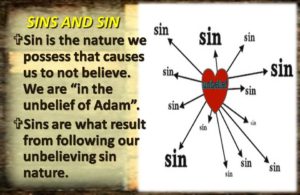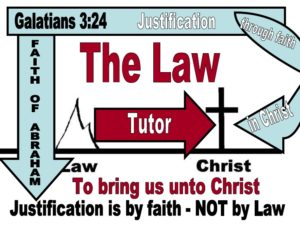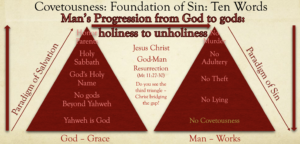
Paradox of Law: Laws Define Good
To Reveal the Evil When Laws Broken
Societies and parents define and enforce evil via laws, rules. Without the law people cannot know what is defined as evil; i.e., expected behaviors. Children cannot perceive acceptable behaviors unless rules are promulgated and consistently applied. However, this very process produces the very behaviors societies and families seek to avoid; a paradox that Paul discussed in Romans. A paradox that challenges one’s worldview of self-goodness.

Sin as a Principle Revealed to Cain
Sins Sin Produces Revealed by the Law
God had rejected Cain, Strong One, while accepting Abel, Worthless One, which caused no small consternation in Cain who was being groomed as Man’s redeemer by his mother, Eve. God warns Cain that his sin stalks him and he must control the beast because it works against him (Ge 4:6-7). Cain kills the one he was to release from Satan, is marked by God who informs him that murder is wrong. Cain wanders {nod} to the land of Nod {Wanderers} to build cities which require laws to control behaviors of those who are in constant rebellion against God. This is a paradox in itself; the one who rebelled against law and order then seeks to produce order through law (Ge 4:14-17). Cain’s great-great-great-grandson, Lamech, bragged that he was justified in killing a young man who had wounded him (Ge 4:23-24). Man’s infantile understanding of sin and sins quickly overran the antediluvian world that God had to destroy the society and reform the world to retard the sweeping destruction of sin via the Cataclysm (Ge 6:1-8). From the destruction of the old world God begins to select a single man to produce a people through whom He would give His Moral Law, Ten Words, to be an example to prepare the world for the coming of His Son, the Messiah (Ex 20:1-17). However, there was a problem; the Moral Law did not produce moral people. The Hebrew people not only wrestled with idolatry until the Babylonian Captivity, they remained in rebellion and unbelief against God even when Messiah came (Mal 2:7-9, 2:17-3:1). So, why did the Moral Law not produce positive changes in the lives of the Jews? Except for the few exceptions detailed in the Old Testament, such as Isaiah, David, and even Nebuchadnezzar {Gentile Persian king in Daniel}, the people were corrupt, vengeful and certainly haters of God even to the killing of a priest in the Temple area, Zechariah (2Ch 24:20-22; Lk 11:46-52). Though the Law was good and defined God’s moral character, and the character of those who will experience the new covenant, it could not change the nature of sinners. Thus, Christ said that it was impossible to merge the old covenant (Law) with the new covenant as they were of two different natures (Lk 5:34-39). Also, those who embraced the Old would reject the New which is seen in the book of Acts as the greatest enemies of the new covenant {Church} were the Jews themselves who fought against God tooth and nail.

Law never designed to end Sin
Law a Light to Highlight One’s Sin
The Law was man’s tutor, teaching mankind about sins, the produce of sin. Man teaches that ignorance is no excuse under the law; however, God desires that no one perish so He does not bring punish for sins of ignorance; i.e., God did not kill Cain, nor allow others to do so, as there was no prohibition against murder until Cain killed Abel. The Moral Law, written in everyone’s soul, is the guideline to guide behavior and understanding of one’s sinfulness. Man sought to find righteousness in the Law, and it was there but it was God’s righteousness. Man could find no righteousness in the Law for it was a mirror reflecting his own sinfulness back to Him and providing a standard detailing his exceeding sinfulness. Thus, the laws, rules, were not provided to change behavior; this would require a new nature and thus beyond the scope of the Law. Law could only illuminate man’s sinfulness and give a sentence of death for any infraction of the Law (Ja 2:10). In fact, the Law incited sinfulness through its specific commandments (Ro 7:7-8). Why?
The sin nature will never submit to God, it cannot! Pietism demands that law be used to force sinners to live God’s morality or face punishment. Any compliance is a sham that fools both the pietist and the sinner; thus, this is why Prohibition and the War on Drugs have been miserable failures. The Law only inflamed the sin nature to violate the commandments so that one’s sin became undeniable to one’s self and others. Sin could no longer hide under a blanket of anonymity such as normal human behavior. When the commandment came, sin revived because it now produced guilt in the conscience, a gift of God indicating that one’s sin had violated God’s Law. Guilt was the prod to drive one to seek God; except the sinner’s mind will never accept the things of God for they are foolishness to it (1Co 2:14). Herein is the paradox: the Law prohibits evil behavior, gives a sentence for violating the Law but is unable to change the nature to produce righteousness; nor does the sinner want to change! What can a person do?

Law’s Purpose: Illuminate Sinfulness and
Messiah: Only One Who Kept Law
Under the weight of guilt, self-condemnation and God’s coming confrontation man did what Cain did, whine and hide. Cain complained that his punishment was, “…greater than I can bear (Ge 4:13)!” Since man could not make the guilt or the Law go away, man perverted the Law into a means of self-righteousness. Though the Moral Law was given to the Hebrews in the beginning, it is applicable since all governments, and families, make rules and demand others live by them. These man-made commandments mirror, in some respect, the Ten Words and thus illicit the same response from lost people: rebellion. Thus, in general, man takes the law(s) and seeks to prove his rightness by attempting to keep the rules and thereby proving rightness. This appears to work with other people; however, deep down one understands God is not fooled because you are not fooled. Your unbelief condemns you, fueling your guilt. Attempting to keep the Law is adultery with both sin and Christ. Sin will not release you from its grip, and is not impressed with attempts of self-righteousness, nor will Christ accept you since you do not have a changed heart (1Sa 10:9; Mt 22:1-14).
The parents who lay down rules to guide their children’s development are inflaming their children’s sin nature, the exact opposite of their intentions; the same for governments. One expects to make people better by making rules but the opposite is always true. Should one not make rules? Of course not! God gave His Moral Law so everyone would begin to understand the nature of His righteousness, their sinfulness and be prepared to receive Christ in the fullness of their time (Ga 3:21-24). Parents today refuse to make rules, enforce guidelines or otherwise seek to guide the character development of their children. This leads to development of a people who do not know their sin and eagerly follow those who will tell them what they want to know via myths (2Ti 4:3-4; 2Th 2:9-12). Governments who pervert their laws also develop a people who will stand against God and for Satan. Christians are not called to stand against governments, rebellion; but to obey the authorities who rule by God’s allowance (Ro 13:1-2).
The paradox: giving rules that promote the very behaviors one seeks to avoid or do not give rules which allows sinful behaviors. One’s sin nature will express itself in sins for it can do no less. The real choice is making people aware of their rebellious sin nature or allowing them to live in ignorance and still die in their sins without hope. A clear choice for Christians, I hope.
